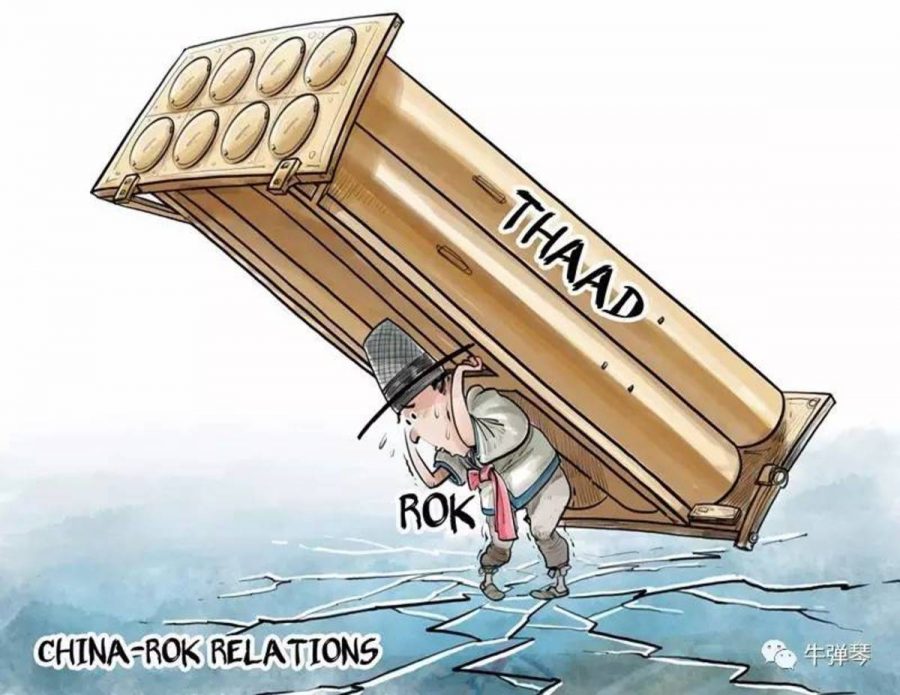By Adam Peng ’17, Perspectives Section Editor
On July 8th, 2016, The United States and South Korea announced the decision to deploy
THAAD (Terminal High Altitude Area Defense), a missile defense system in South Korea in response to the threat from North Korea. It is a United States Army anti-ballistic missile system which is designed to shoot down short, medium, and intermediate range ballistic missiles in their terminal phase using a hit-to-kill approach. The transportation of related equipment began on March 7th, 2017, which has brought great attention and divisive opinions in East Asia, mainly concerning North and South Korea, Japan, China and Russia.
The attack range of THAAD reaches up to 300 kilometers, threatening areas as far as Northeast China. More than that, the X-Radar area reaches far out of the Korean peninsula into the core area of mainland Asia, which means any launching of a missile by China would be watched over by the US.
South Korean politicians and civilians have started to take sides on this controversial issue. Some people believe that the implementation of THAAD is necessary for protecting the homeland against North Korea, while most of the Korean business man fear that the Chinese government will use economic sanctions against South Korea that will destroy the bilateral relationship between China and South Korea in an instant.
As expected, one side effect of THAAD has been a great shock on the Korean economy recently. The idea of US using South Korea as a puppet has brought people’s anger to a climax. 90% of LottoMarts, a Korean chain store, in China are temporarily closed over the last two weeks due to lack of customers. Many of the Chinese employees from Lotto decided to resign; almost all LottoMarts appear to be empty, even in some of the largest cities in China. On tourism: the number of Chinese tourists going to Korea has also decreased by 26.6%. Over 400 thousand people have cancelled trips to South Korea. Some of the restaurants in China have even refused to provide any service to Koreans.
The Chinese government has also taken moves on this economic threat to South Korea. On Feb. 25th, the State Administration of Radio Film and Television forbade all imports of Korean TV shows and series. Surprisingly, most Chinese people reacted with an extremely supportive attitude. Some of them say that there is no need to forbid them since they would not watch Korean shows anyway. This effective boycott against Korea caused the two biggest Korean entertainment companies, YG Entertainment and SM Entertainment’s stock price to decrease by 7.96% and 5.32%.
However, the effort of South Korea on the THAAD issue has not ceased Korean resistance. If anything, Korean media has shown an opposite attitude. On March 4th, DongA Daily published an editorial named Where is the Nation’s Dignity if Become Submissive to Revenge on THAAD? Earlier on March 3rd, Korean Daily published an editorial named Degree of Relying on China Needs to be decreased to Fight Against Boycott. Such comments have further angered the Chinese people and caused the side-effects of the THAAD incident to heat up.
Despite the increasing hatred between the two countries, the United States has already achieved great purpose with its move on THAAD. It has tested the lowest permissible level of China, destroyed the economic relationship between China and Korea, and encouraged its allies in Asia to oppress China.
The result of this invisible economic war remains unrevealed, but the outcome has clearly stood on the side of China. The world will be waiting on America’s reaction while the final part of THAAD finishes deployment.
Photo Sources:
http://www.p5w.net/weyt/201704/t20170417_1763451.htm
Other Sources:
http://military.china.com/important/11132797/20170302/30294337_all.html
https://en.wikipedia.org/wiki/Terminal_High_Altitude_Area_Defense
https://bbs.hupu.com/18574719.html
https://bbs.hupu.com/16992436.html
https://bbs.hupu.com/18636662.html
https://www.zhihu.com/question/41383772







